Eco-Friendly Wheels:
Biking Movement Dares Kampala’s Mass Transit Pollution
Written by: Leticia Mmeeme and Richard Mugambe. Photography by Barbra Leni
Written by: Leticia Mmeeme and Richard Mugambe. Photography by Barbra Leni
It is the last Friday of June 2024. City Hall, the administrative home of Kampala Capital City Authority (KCCA), a body that governs Uganda’s Capital Kampala is buzzling.
Dozens of cyclists prepare for their routine end of month ride, chanting in call and reply: “Kampala Cycling Day, For Safer Cycling Lanes!”
“We cycle once a month on the last Friday of the month,” says Rass B Sali, who leads the enchantment.
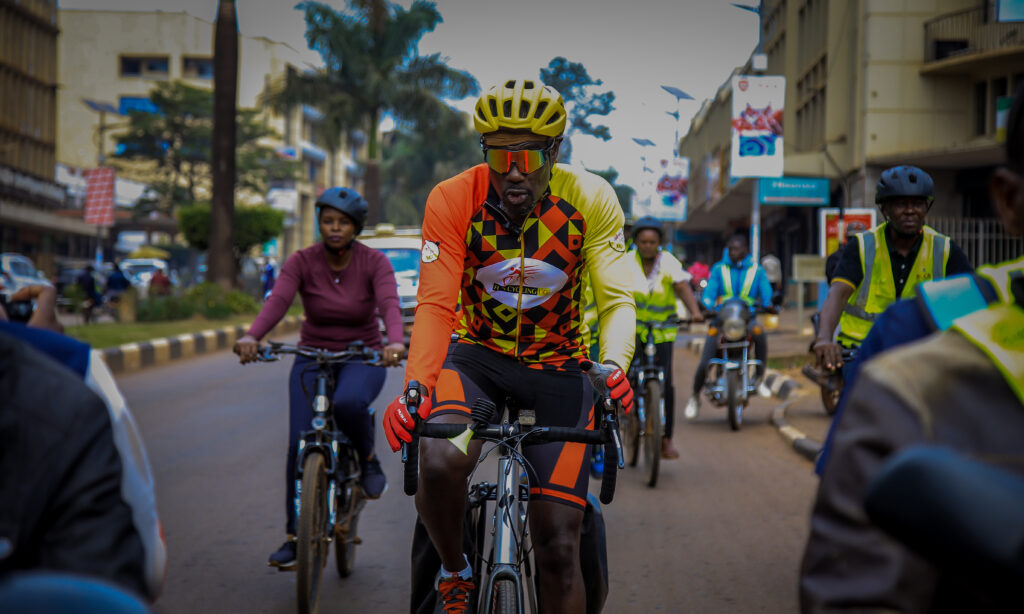
Cyclists led by Rass Ssali take to the streets in Kampala. Photo by Barbra Leni.
The monthly cycling thrill is gaining momentum on social media platforms like X among city dwellers. It started in January 2024 with an underwhelming turn-up.
“Our first ride was almost canceled because the numbers were too low. Only community responses from the few appearances and their support in sharing the message further kept the vision alive. Their commitment affirms that people are embracing our message and work to get it out there,” recounts Hakim Owiny who has coordinated the activities since.
The cycling is being pioneered by eBee, a pan-African e-mobility social enterprise founded at the end of 2021 in Kenya. It is currently operational outside Kenya, with branches in Uganda and Rwanda.
This month, they partnered with KCCA, Makerere University College of Health Sciences and School of Public Health and Fun Cycling Uganda, another biking initiative in the city.
Owiny, who leads on the Advocacy and Activation in eBee’s Ugandan business, says the cycling movement is offering eco-friendly transit solutions for the crowded city and the region.
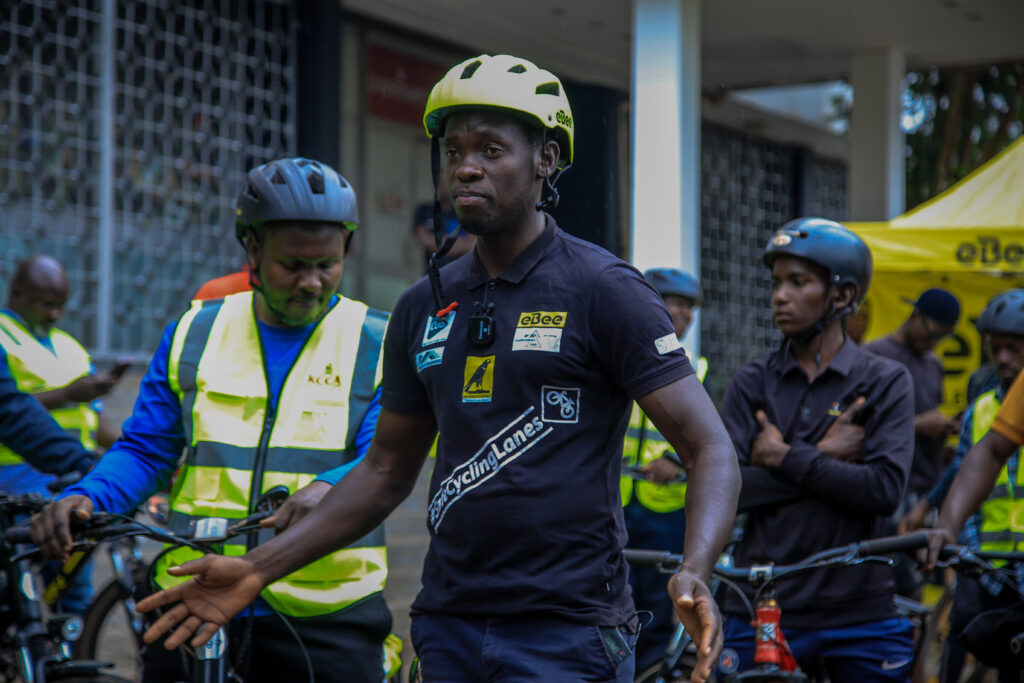
Hakim Owiny who leads Advocacy and Activation for eBee in Uganda speaks to riders ahead of the city tour. Photo by Barbra Leni.
-Against the polluting mass transit-
Mass transit is one of the biggest air pollutants in Uganda’s capital. It is estimated that about two million cars shove through the city daily, ferrying the more than four million people who work and live in it as well as their goods.
The emission corrupts the air quality and jerks the skies for heat. Kampala’s temperatures now swing past 30 degrees on a normal day, a 1.3°C rise from the early 70s.
The city is the 8th most polluted in Africa. The environment regulator, National Environment Management Authority(NEMA) says the air pollution level in Kampala is eight times higher than the recommended standard.
Bicycling, in contrast, is a cleaner form of transportation. One mile cycled saves over 300 grams of toxic CO2 greenhouse emissions that would have been released by a gasoline engine.
For Owiny and eBee the effort is to have more electric bicycles to better air quality and livelihoods for everyone across the value chain by cutting costs on transportation. But these also must come with a better road infrastructure.
The eBee opened in August 2023 and is using the monthly ride to win more hearts to ride and build a cycling culture in the country while challenging policy makers to improve the road infrastructure.
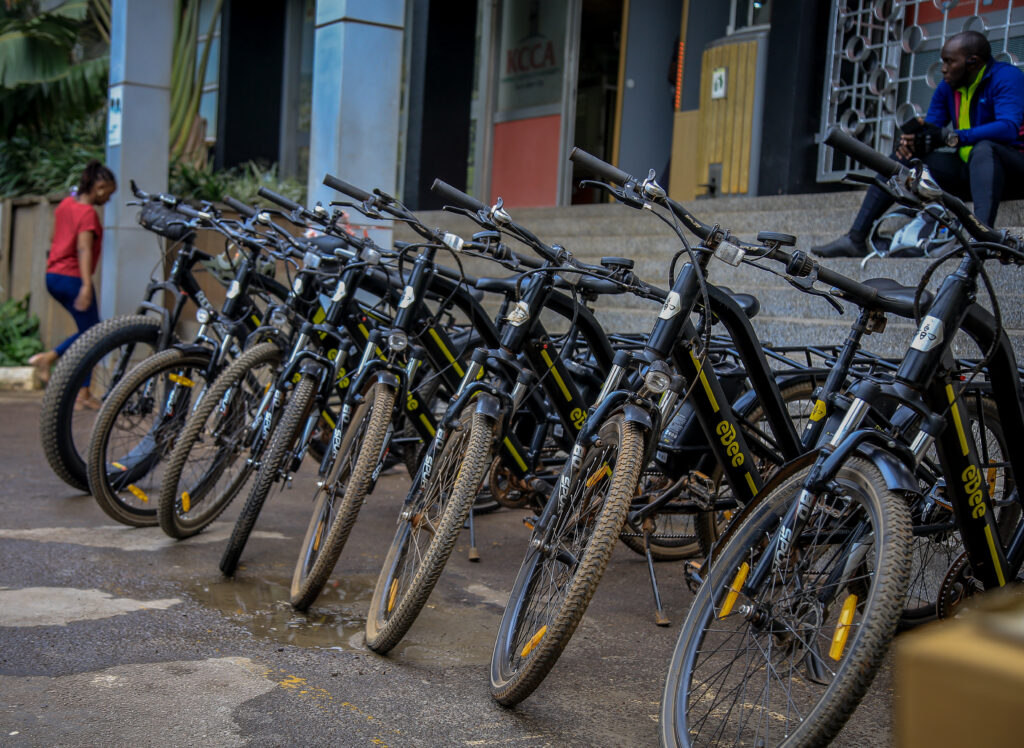
Some of the bikes being pioneered on the Ugandan market by eBee. Photo by Barbra Leni.
-Safety first-
Kampala’s roads are not friendly to cyclists. The city still runs on the colonial road infrastructure setup which was designed for less than 100,000 vehicles in the 1960s, according to KCCA’s 2022 report on the state of Kampala Affairs.
That number has since ballooned.
Also, the growing number of motorists have to compete with potholed-tarmac, open manholes, sewer trenches among others, on roads that are not even marked to cater for cyclists.
The riders meet every month to augment calls for better infrastructure to be set up such that vehicles, motorcycles, bikes, and pedestrians don’t have to compete for space.
Among the day’s cyclists is Irene Namuyiga, a road safety Engineer at the city authority. On her account, cycling has made her see the risks cyclists face each day as they try to navigate the city.
“Every time I cycle, it’s a painful experience. I feel like we are not doing enough as engineers to protect cyclers. We have to work towards providing safe cycling lanes. Other road users are usually aggressively fighting for space, which makes it unsafe for the cyclists,” says Namuyiga.
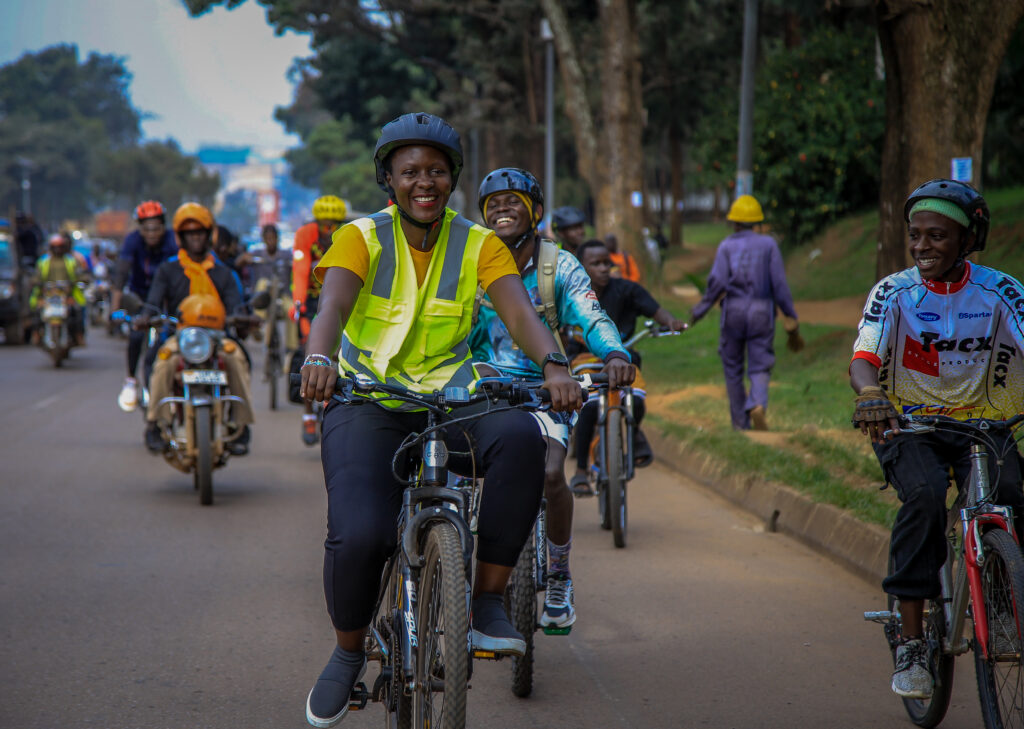
Irene Namuyiga, the Road Safety Engineer at Kampala Capital City Authority takes part in the ride. Photo by Barbra Leni.
-Peddling is the future-
The 6th edition of the Kampala Cycling Day attracted over 30 cyclists. Their route looped the metropolis, navigating tricky intersections like Parliament Avenue, Jinja Road junction, Yusufu Lule Road, Mulago Roundabout, Wandegeya, Bombo Road, and Kampala Road, before finding their way back to the city hall.
The bicycles used during the Kampala Cycling Day differ from the traditional ones. The company is pioneering two products including; the Nyuki e-bicycle specifically made for women, with a carrier designed for market and domestic work and the eBX e-bike designed for adventure.
Both bikes rely on a power assisted pedalling which can go as far as 90 Km on a single charge.
“E-bicycles, just like any bike, must be pedaled. The difference is once you start pedaling, this bicycle can detect the speed at which you are moving and assist you by boosting the bike to move faster,” explains Benon Okwari, a technician at ebees
Riding is believed to be energy intensive, discouraging commuters from cycling to work with the fear of physical exertion.
“It’s different with eBees. They are not that energy intensive, you won’t have to sweat while riding, and we thought that was a good way of promoting a cycling culture in the city.” Okware adds.
Ebees is fronting SDG 11 “sustainable cities and communities”, with a practical solution to transportation and emissions.
“This day means a lot to me as a cyclist … I want to blow this trumpet as loud as I can until the policies to have safe cycling lanes are implemented. Ssali, the enchanting cyclist, remarked with a conviction that the baby steps they are taking will eventually bear fruit in their advocacy journey which has not come without challenges.
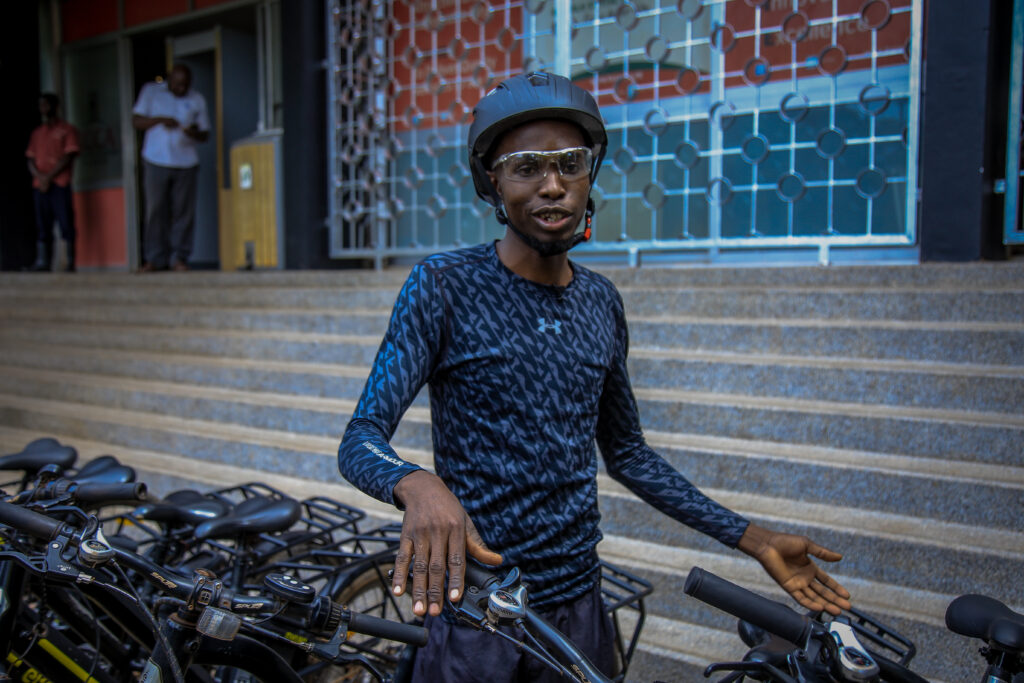
Benon Okwari, the eBees technical engineer. Photo by Barbra Leni.
Historically, bicycles are as true to African households as their heritage. They were first imported into the country around 1891, the ‘iron donkeys’ as they were popularly referred to at the time caught on, becoming a reliable means of transport.
Many moons later, society evolved and adopted modern means of transport. Cars replaced bicycles as the more reliable means of transport, and so too, a symbol of prestige and success.
Humans in the global south have now woken up to a realisation that tools that seem as mundane as a bike could bring back the cooler, quieter and peaceful past now immensely cherished in such a hot and noisy time.
© 2022 - Media Challenge Initiative | All Rights Reserved .
© 2022 - Media Challenge Initiative | All Rights Reserved .